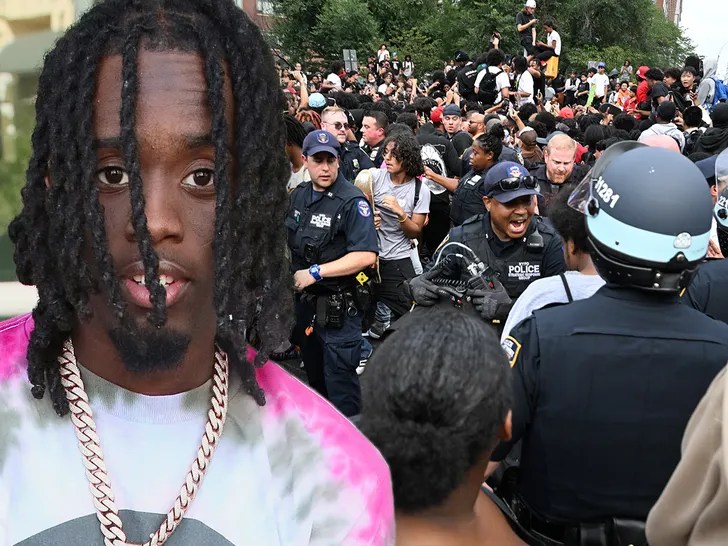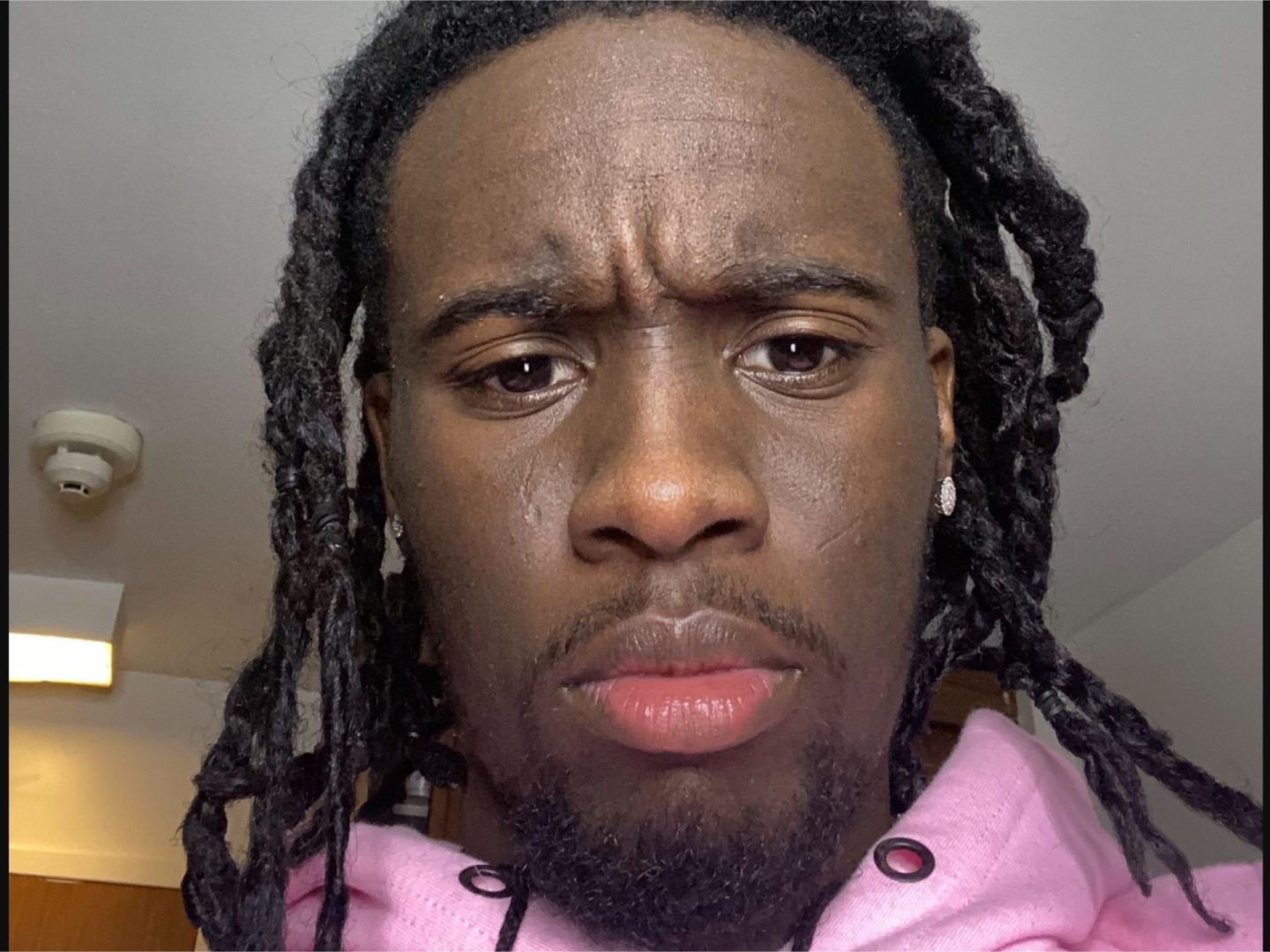Kai Cenat Going To Jail
Kai cenat is a popular American streamer and internet personality. He is best known for his live streams on the platform Twitch. Recently, Cenat has been in the news due to his arrest and subsequent release on bail.
Cenat was arrested on January 26, 2023, in Atlanta, Georgia. He was charged with felony possession of marijuana and misdemeanor possession of a firearm. The arrest came after police officers responded to a call about a disturbance at a local apartment complex.
Cenat's arrest has sparked a lot of discussion and debate online. Some people believe that the charges against him are too harsh, while others believe that he should be held accountable for his actions.
kai cenat going to jail
The arrest and subsequent release on bail of popular American streamer and internet personality Kai Cenat has brought to light several key aspects related to the criminal justice system, celebrity culture, and the evolving nature of online entertainment.
- Legal implications: The charges against Cenat, including felony possession of marijuana and misdemeanor possession of a firearm, highlight the potential legal consequences of drug and weapons possession.
- Celebrity status: Cenat's arrest has sparked discussions about the heightened scrutiny and potential biases faced by celebrities in the criminal justice system.
- Online influence: Cenat's large online following raises questions about the impact of social media and streaming platforms on shaping public opinion and influencing perceptions of crime and justice.
- Mental health: Cenat has spoken openly about his struggles with mental health, highlighting the importance of addressing mental health issues within the criminal justice system.
- Race: Cenat's arrest has also sparked conversations about racial disparities in the criminal justice system, particularly as they relate to drug and weapons charges.
- Privacy: The public scrutiny and media attention surrounding Cenat's arrest raise questions about the right to privacy and the ethical implications of reporting on celebrity arrests.
- Bail: Cenat's release on bail underscores the importance of bail reform and the need to ensure fair and equitable access to pretrial release.
- Rehabilitation: The case highlights the role of rehabilitation and reentry programs in helping individuals charged with crimes successfully reintegrate into society.
- Community impact: Cenat's arrest has had a significant impact on his community, raising awareness about the challenges faced by young people and the importance of community support.
These aspects are interconnected and complex, reflecting the multifaceted nature of the criminal justice system and its intersection with celebrity culture and online entertainment. The case of Kai Cenat serves as a reminder of the importance of due process, fairness, and the need for a more just and equitable criminal justice system for all.
Legal implications
The charges against Kai Cenat for felony possession of marijuana and misdemeanor possession of a firearm underscore the serious legal consequences of drug and weapons possession. These charges can have significant implications for Cenat's personal life, career, and future prospects.
- Criminal record: A felony conviction can result in a permanent criminal record, which can make it difficult to obtain employment, housing, and other benefits.
- Jail or prison time: Felony possession of marijuana and misdemeanor possession of a firearm are both serious offenses that can result in jail or prison time.
- Fines: Cenat could also face substantial fines if convicted of these charges.
- Loss of rights: A felony conviction can result in the loss of certain rights, such as the right to vote or own a firearm.
The legal implications of these charges are a reminder of the importance of obeying the law and avoiding illegal activities. Cenat's case also highlights the need for fair and just treatment in the criminal justice system.
Celebrity status
Kai Cenat's arrest has brought to light the heightened scrutiny and potential biases that celebrities face within the criminal justice system. As a well-known streamer and internet personality with a large following, Cenat's case has garnered significant media attention and public commentary.
This heightened scrutiny can lead to celebrities being treated differently than non-celebrities, both in terms of the charges they face and the way their cases are handled. For example, celebrities may be more likely to be arrested and charged with crimes, even if the evidence against them is weak. They may also be more likely to be held in jail without bail, and to receive harsher sentences if convicted.
There are several reasons why celebrities may face heightened scrutiny and potential biases in the criminal justice system. One reason is that celebrities are often seen as role models and public figures. As a result, their actions are often held to a higher standard than the actions of non-celebrities. Another reason is that celebrities are often wealthy and have access to powerful attorneys. This can give them an advantage in the criminal justice system, as they can afford to hire the best legal representation and mount a strong defense.
The heightened scrutiny and potential biases that celebrities face in the criminal justice system raise important questions about fairness and equality. It is important to ensure that all individuals, regardless of their celebrity status, are treated fairly and equally under the law.
Online influence
The arrest of Kai Cenat has sparked discussions about the impact of social media and streaming platforms on shaping public opinion and influencing perceptions of crime and justice. Cenat's large online following has given him a powerful platform to share his thoughts and experiences, and his arrest has led to a great deal of public debate about the charges against him, the fairness of the justice system, and the role of celebrities in society.
- Public opinion: Cenat's large online following has given him a powerful platform to share his thoughts and experiences, and his arrest has led to a great deal of public debate about the charges against him, the fairness of the justice system, and the role of celebrities in society.
- Media coverage: Cenat's arrest has been widely covered by the media, and this coverage has helped to shape public opinion about the case. The media's portrayal of Cenat and the charges against him can influence how the public perceives the case and the justice system as a whole.
- Celebrity culture: Cenat's arrest has also raised questions about the role of celebrities in society. Some people believe that celebrities should be held to a higher standard than, while others believe that they should be treated like everyone else. This debate highlights the complex and often contradictory nature of celebrity culture.
- Social justice: Cenat's arrest has also sparked discussions about social justice issues, such as racial profiling and mass incarceration. Some people believe that Cenat's arrest is an example of racial profiling, while others believe that he was treated fairly by the justice system. This debate highlights the importance of addressing social justice issues in order to create a more just and equitable society.
The impact of social media and streaming platforms on shaping public opinion and influencing perceptions of crime and justice is a complex and multifaceted issue. Cenat's arrest has brought this issue to the forefront of public debate, and it is an issue that will continue to be debated in the years to come.
Mental health
The arrest of Kai Cenat for felony possession of marijuana and misdemeanor possession of a firearm has brought to light the importance of addressing mental health issues within the criminal justice system. Cenat has spoken openly about his struggles with mental health, and his case highlights the need for more comprehensive and compassionate approaches to crime and punishment.
- Stigma and discrimination: Mental illness is often stigmatized, and people with mental health issues may face discrimination in the criminal justice system. This can lead to them being treated unfairly, both in terms of the charges they face and the way their cases are handled.
- Lack of access to treatment: People with mental health issues often have difficulty accessing treatment, which can lead to them committing crimes as a result of their untreated illness. The criminal justice system needs to do more to provide access to treatment for people with mental health issues, both in jail and in the community.
- Alternatives to incarceration: For people with mental health issues, jail or prison may not be the most appropriate response to their crimes. There are a range of alternative sentencing options that can be more effective in addressing the underlying causes of their criminal behavior, such as mental health treatment, drug treatment, and job training.
- Reentry support: People with mental health issues who are released from jail or prison often face significant challenges in reintegrating into society. They may need help finding housing, employment, and mental health treatment. The criminal justice system needs to do more to provide reentry support for people with mental health issues.
Addressing mental health issues within the criminal justice system is essential for creating a more just and equitable society. By reducing stigma, increasing access to treatment, and providing alternatives to incarceration and reentry support, we can help to ensure that people with mental health issues are treated fairly and given the opportunity to succeed.
Race
Cenat's arrest has brought to light the racial disparities that exist within the criminal justice system, particularly as they relate to drug and weapons charges. African Americans are more likely to be arrested, charged, and convicted of drug and weapons offenses than white Americans, even though they use and sell drugs at similar rates. This disparity is due to a number of factors, including racial profiling, biased policing, and harsh drug laws.
Cenat's case is a reminder of the need to address racial disparities in the criminal justice system. We need to reform our drug laws, train police officers to avoid racial profiling, and provide more support for communities of color. By taking these steps, we can help to create a more just and equitable society for all.
The connection between "Race: Cenat's arrest has also sparked conversations about racial disparities in the criminal justice system, particularly as they relate to drug and weapons charges." and "kai cenat going to jail" is clear. Cenat's arrest has brought to light the racial disparities that exist within the criminal justice system, particularly as they relate to drug and weapons charges. This disparity is a serious problem that needs to be addressed. By understanding the connection between race and the criminal justice system, we can take steps to create a more just and equitable society for all.
Privacy
In the case of "kai cenat going to jail," the intense public scrutiny and media attention have raised important questions about the right to privacy and the ethical implications of reporting on celebrity arrests. Here are a few key aspects to consider:
- Right to privacy: All individuals, including celebrities, have a right to privacy. This right is protected by the Fourth Amendment to the U.S. Constitution, which prohibits unreasonable searches and seizures. When the media reports on celebrity arrests, they must be careful not to violate this right.
- Public interest: The public has a right to know about the actions of public figures, including celebrities. However, this right must be balanced against the right to privacy. The media must carefully consider the public interest before reporting on private information about celebrities, such as their arrest records or personal lives.
- Sensationalism: The media often sensationalizes celebrity arrests in order to attract viewers and readers. This can lead to inaccurate or misleading reporting, which can damage the reputation of the celebrity and their family.
- Due process: All individuals, including celebrities, are entitled to due process of law. This means that they have the right to a fair trial and to be presumed innocent until proven guilty. The media must be careful not to report on celebrity arrests in a way that prejudices the outcome of their trials.
The case of "kai cenat going to jail" highlights the complex and often conflicting issues that arise when the media reports on celebrity arrests. It is important to remember that celebrities have the same rights as everyone else, including the right to privacy and due process. The media must carefully consider these rights before reporting on celebrity arrests.
Bail
Kai Cenat's case is a reminder that bail reform is necessary to ensure that all individuals have fair and equitable access to pretrial release. The current bail system discriminates against the poor and people of color, who are more likely to be held in jail before trial simply because they cannot afford to pay bail.
- Disproportionate impact: The bail system has a disproportionate impact on low-income individuals and communities of color. Those who cannot afford to pay bail are often held in jail for weeks or even months before their trial, even if they are presumed innocent.
- Loss of liberty: Pretrial detention can have a devastating impact on an individual's life. It can lead to job loss, housing instability, and loss of child custody.
- Alternatives to bail: There are a number of alternatives to bail that can be used to ensure public safety while also protecting the rights of the accused. These alternatives include supervised release, electronic monitoring, and risk assessment tools.
- Right to a fair trial: The right to a fair trial is a fundamental principle of our criminal justice system. Bail reform is necessary to ensure that all individuals have an equal opportunity to defend themselves against the charges against them.
The case of Kai Cenat highlights the urgent need for bail reform. By ending the wealth-based system of pretrial detention, we can create a more just and equitable criminal justice system for all.
Rehabilitation
The case of Kai Cenat's arrest and subsequent release on bail underscores the importance of rehabilitation and reentry programs in helping individuals charged with crimes successfully reintegrate into society. These programs provide critical support and resources to help formerly incarcerated individuals rebuild their lives, reduce recidivism, and become productive members of their communities.
- Job training and placement: Rehabilitation programs often offer job training and placement services to help formerly incarcerated individuals develop marketable skills and find meaningful employment. This is essential for successful reintegration, as employment provides financial stability and a sense of purpose.
- Education and counseling: Rehabilitation programs may also provide educational opportunities and counseling services to help formerly incarcerated individuals address underlying issues that may have contributed to their criminal behavior. This can include substance abuse treatment, mental health counseling, and life skills training.
- Housing and support services: Many rehabilitation programs provide housing and support services to help formerly incarcerated individuals transition back into the community. This can include assistance with finding affordable housing, transportation, and other essential resources.
- Mentoring and peer support: Rehabilitation programs often provide mentoring and peer support to help formerly incarcerated individuals connect with positive role models and build a network of support. This can help them stay on track and avoid returning to criminal behavior.
The case of Kai Cenat is a reminder that rehabilitation and reentry programs are essential for creating a more just and equitable society. By providing support and resources to formerly incarcerated individuals, we can help them rebuild their lives, reduce recidivism, and become productive members of their communities.
Community impact
The arrest of Kai Cenat has brought to light the significant challenges faced by young people in our communities. Cenat's case has sparked important conversations about the need for positive role models, mentorship programs, and community-based initiatives to support young people and help them make positive choices.
Cenat's arrest has also highlighted the importance of community support in helping individuals overcome adversity. In the wake of his arrest, Cenat has received an outpouring of support from his fans, friends, and family. This support has helped Cenat to stay positive and focused on his goals. It has also shown him that he is not alone and that there are people who care about him and want to help him succeed.
The case of Kai Cenat is a reminder that we all have a role to play in supporting our communities and helping young people reach their full potential. We can provide mentorship and guidance, create opportunities for young people to succeed, and advocate for policies that support young people and their families. By working together, we can create a more just and equitable society for all.
The case of "kai cenat going to jail" has shed light on a number of important issues, including the racial disparities in the criminal justice system, the importance of mental health treatment, and the need for bail reform. It has also highlighted the challenges faced by young people in our communities and the importance of community support.
These issues are interconnected and complex, and they require a multifaceted approach to address them. We need to work together to create a more just and equitable society for all. This means reforming our criminal justice system, investing in mental health treatment, and supporting our young people.
Garavaglia Jan
Stranger Things Kid With No Teeth
Jeffersons Cast Members



ncG1vNJzZmilkajBpr6XcWWapaNoe6W1xqKrmqSfmLKiutKpmJydo2OwsLmOpJiiZZOau6LAjKCmoqaXYsGwecmaoKVmmKm6rQ%3D%3D